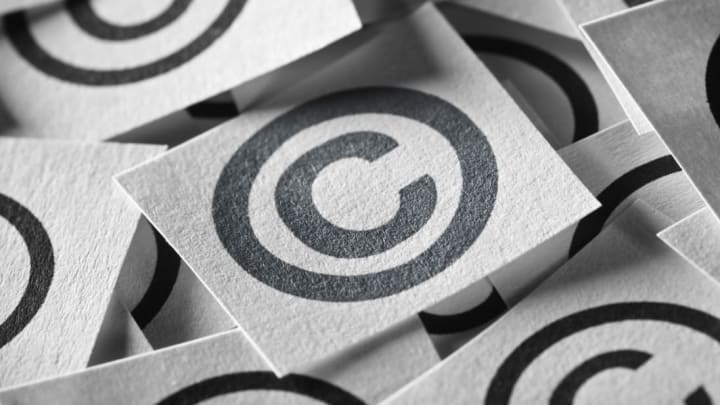What's the Difference Between Copyright, Trademark, and Patents?

The concept of protecting intellectual property—a.k.a. any product derived from an idea—appeared as early as 500 BCE, when Greek chefs were granted year-long exclusive rights for creating specific cuisines. Although we’ve come a long way since then, the goal of all intellectual property protection remains the same: To prevent the unlawful copying of ideas, and as a result, encourage folks to make something new instead. Copyrights, trademarks, and patents are the three most common ways of protecting intellectual property. But what they protect, and how long those protections last, are vastly different.
Intellectual properties
“Copyrights and patents have the same goal; they just pursue it in different fields,” NYU Law professor Christopher Jon Sprigman tells Mental Floss. “For copyrights, it’s new artistic and literary works; for patents, it’s new scientific and technological works.” So while copyright covers things like books, plays, and movies, patents protect items like drugs, inventions, and technologies.
But while copyrights typically last for the lifetime of an author plus 70 years, patents only last for 20 years from the date they’re filed. That means a patented idea can be enjoyed by the public—and encourage fair competition—for free much sooner, which makes sense since scientific and technological works would have a more immediate benefit.
“That’s often why you see such high drug prices when something’s still under a patent, and it plummets after a generic manufacturer has entered into the space to compete,” NYU Law professor Jeanne Fromer tells Mental Floss. More benefits for the public and more free-market competition? That’s the intellectual property goal.
Trademarks
Trademarks are different in that they don’t protect artistic or technological works, but instead, the companies that create them. “It helps you sort through the different product offerings in a competitive market,” Sprigman says. There are more obvious trademarks—like logos and brand names—but you can also trademark smells, designs, and sounds. The scent of Play-Doh is trademarked, as is the NBC chime and Coca-Cola's glass bottle design. Trademarks can last indefinitely so long as they’re in active use.
Copyrights
Copyrights are automatically created the moment you produce something, while trademarks are instantly born out of use in commerce. Everything from the pictures you take for your social media profile to your latest blog post fall under copyright protection, while the name of your family business has some common-law trademark protections. But formally registering for copyright allows you to collect statutory damages in an infringement case, which is a set amount established by the courts of up to $150,000 (you could also recover your attorney's fees). For unregistered copyright claims, you would have to prove actual damages, such as a loss of revenue, which is much more difficult and can yield a lower payout. Registering for a trademark also grants you exclusive nationwide usage, so the benefits are definitely worth it.
Patents
Patents, on the other hand, are not granted automatically. First, the patent application needs a precise description of the scientific or technological work. And after filing, the work requires a thorough examination by an expert [PDF] patent examiner to determine whether the item meets their standards. Patents grant the broadest rights, so they also have the most rigorous approval process.
Even though copyrights, patents, and trademarks share some major differences, they all benefit creators of intellectual property and, ultimately, the general public. So the next time you create something new—whether it be a book, an invention, or a logo—consider making it official with the United States Patent and Trademark Office or the U.S. Copyright Office. You might just reap the benefits for years to come.
Have you got a Big Question you'd like us to answer? If so, let us know by emailing us at bigquestions@mentalfloss.com.